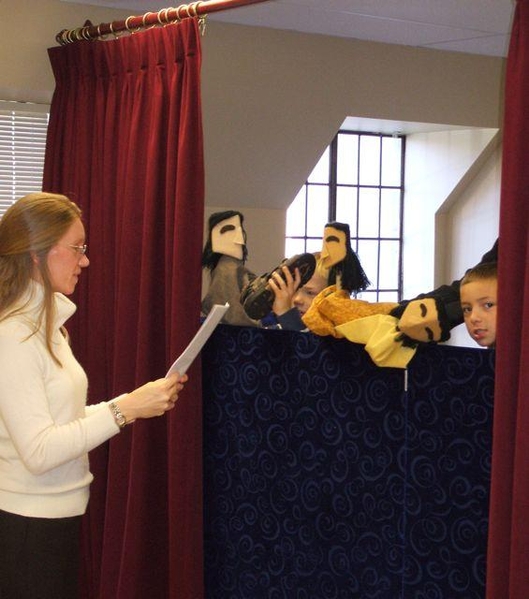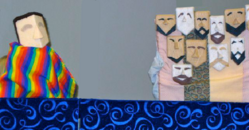Holy Week: Jesus' arrest and trials
Handle-Bag Puppet Workshop

Summary of Lesson Activities:
Students will use handle-bag puppets to enact a modern story of persecution, similar to Jesus’ arrest and trial.
Scripture Reference:
Luke 22:66 - 23:25 (the trials before the council, Herod, and Pilate)
Key Bible Verse:
“He came to help, to put the world right again.” John 3:17b (The Message)
Workshop Objectives – participants will:
- Be able to retell the events of Holy Week
- Understand the importance of the events of Holy Week; specifically, that it is through Jesus’ death and resurrection that our sins are forgiven.
- Know that even though he was accused of doing wrong, Jesus was innocent.
- Help the children better understand the social injustices that led to Jesus’ death on the cross.
Leader Preparation:
- Read the scripture for this lesson.
- Read and reflect on the overview material provided for this lesson.
- Gather the materials.
- Write these words on the easel: arrest, trial, guilty, innocent
- Write the key Bible verse on the easel.
Materials List:
- Easel with appropriate marker
- Handle-bag puppets; 3 for the main characters & several puppets for the crowd (or use whatever sort of puppets you have on hand)
- A puppet stage
- Script entitled “The Crowd” from Kirk of Kildaire (attached)
- A ten-dollar bill (play money)
Lesson Plan
Opening:
Greet your students warmly, introducing yourself and any other adults.
Say: Welcome to the puppet workshop. In this workshop, we use puppets that are very easy to use. We are learning (continuing to learn) about the story of Holy Week. For today, I want you to think for a minute about these words (refer to the easel).
Ask: What do these words mean? (Discuss the meanings of the words.)
- Arrest – to capture and take into custody by an authority of the law
- Trial – the formal examination of an accused person before a judge or jury
- Guilty – responsible for committing a crime or an act of evil which deserves punishment
- Innocent – not guilty of a crime; blameless; free of sin and/or guilt
Say: Remember these words as we work with the puppets and our Holy Week story.
Ask: Where in the Bible would we find the story of Holy Week? (in all four gospels of the New Testament – Matthew, Mark, Luke, and John)
Say: We are going to look at the part of Holy Week that shows us the arrest and trial of Jesus. We’ll look in the Bible for the trial scenes.
Do: Distribute Bibles. Have them find Luke, chapter 22, verse 66.
Say: You could say that Jesus was actually in three separate trials.
Review the meaning of the word “trial.” (Refer to the easel).
Say: The first trial was before the Jewish court called the Sanhedrin. The Sanhedrin consisted of 70 men. The president of the Sanhedrin was the high priest, Caiaphas.
Ask students to read Luke 22:66-71.
Say: Jesus told this court that he was God. Look at verse 70. Interestingly, Jesus used the same words that God told Moses at the burning bush – "I AM."
Ask: Do you think that this court gave Jesus a fair trial? (allow all answers)
Say: The Sanhedrin had certain laws that they broke. For instance, no one could be arrested at night, they were to consider each trial for two or three days, and the accused person could not be questioned without someone to defend them.
Ask: Do you think that this court gave Jesus a fair trial? (no)
Say: The Sanhedrin was a powerful court but they couldn’t say that someone could be crucified—only the Roman governor could do that.
Ask: Who was the Roman governor? (Pilate)
Say: So a whole crowd of chief priests took Jesus to Pilate. This was Jesus’ second trial.
Have students read Luke 23:1-7.
Say: Pilate sent Jesus to Herod because Herod ruled over Galilee where Jesus was from. We can say that this was Jesus’ third trial. Herod questioned Jesus but Jesus didn’t say anything. The whole time, the crowd of chief priests was standing there accusing Jesus. Herod sent Jesus back to Pilate.
Have students read Luke 23:13-25.
Ask: Did Pilate or Herod think that Jesus was guilty of a crime? (no)
Did either of them say that Jesus should be put to death? (no)
Who, then, determined that Jesus should be crucified? (allow all answers)
Say: Pilate turned Jesus over to the crowd. They insisted that Barabbas be released. Pilate gave in to the crowd’s demands and sentenced Jesus to die. Jesus was innocent. This part of the story shows the power of mob mentality.
Explore the Bible story's meaning with puppets
Let’s act out another story about mob mentality using puppets. We can do the puppet show more than once, so that some can be in the audience then we’ll switch.
Explain how to use the puppets:
 Show the students one of the handle-bag puppets.
Show the students one of the handle-bag puppets.
Say: We can have lots of fun with these puppets but we need to treat them gently. Like all church property, we will be respectful and careful in our use of the puppets.
Show the kids how the “bag” or body, slips off the rod or handle. Show them how you hold the rod with one hand. Now slip the handle through the top of the bag. Show them how one hand is on the handle and the other hand is in the far corner of the bag – it becomes the “hand” of the puppet. Demonstrate how the puppet can wave, cover their puppet mouth to cough, and pick up something.
Assign parts or have students choose which puppet they want to be.
Puppets needed:
• 3 main character puppets; have 3 students be the crowd.
Enact the story using puppets: Use the script entitled “The Crowd”. Some coaching may be needed for the kids playing the part of the crowd (see script notes).
Perform the show a couple of times, changing parts each time.
Reflection:
Ask: Think about this puppet play we just acted out and the story of Jesus’ arrest and trial. How are the two stories alike? (they both have people who are unfairly accused and judged, and they both have crowds that seem to control the outcome of the story)
Ask: How are they different? (Marcus defended himself a little but Jesus said nothing in his defense)
Why do you think Jesus didn’t defend himself? (Jesus was being obedient to God—just as he was in the Garden. Jesus knew that he was following God’s plan, even though it seemed impossible to follow. “Yet not as I will, but as you will.” Matt. 26:39)
Say: We said this puppet skit would show mob mentality. Think about the crowd in both stories.
Ask: Do you suppose there were people in both stories who thought Marcus and Jesus were being unfairly accused?
Why do you think these people didn’t speak up in support of Marcus and Jesus?
[These questions are trying to lead the kids to realize that people in the crowd were probably afraid to speak against the majority—afraid that they would be punished or hurt as well.]
Say: We call this "mob mentality" because it is almost as if the mob—the crowd—has one mind.
Ask: How do you think the people who disagreed with the crowd but were afraid to say so, felt when they saw Marcus and Jesus being punished unfairly? (they may have wished they had spoken up and tried to stop this unfairness, this injustice)
What might happen if we speak up in a hard situation and go against the crowd?
Say: We might be able to change the situation positively for example, being kind to someone the other kids don’t like, or taking a stand against discrimination (Martin Luther King, Jr.). This is part of being a disciple of Jesus; it is why Jesus said that he was the way, the truth, and the light. It is why we care for our neighbors as we care for ourselves.
Say: For each Bible story we study we try to learn a Bible verse. Let’s say our verse together.
Say the verse together. (Refer to easel.) “He came to help, to put the world right again.” John 3:17b.
Close with prayer.
Resources:
- Hunter, Kurt. Puppets, Kids, and Christian Education. Augsburg Fortress, 2001. See this book for handle-bag puppet construction and manipulation information; more information at Kurt's website.
- Faith Quest Lesson Sets at Kirk of Kildaire Presbyterian Church. “Trial and Crucifixion: Praising Puppets.” 2002. (The attached "The Crowd" puppet script is from here.)
- Haidle, Helen. Journey to the Cross. Zonderkidz, 2001. (ISBN 0-310-70023-X)
A lesson written by Debbie Houghton from First UMC, Ann Arbor, MI
A representative of Rotation.org reformatted this post to improve readability.






